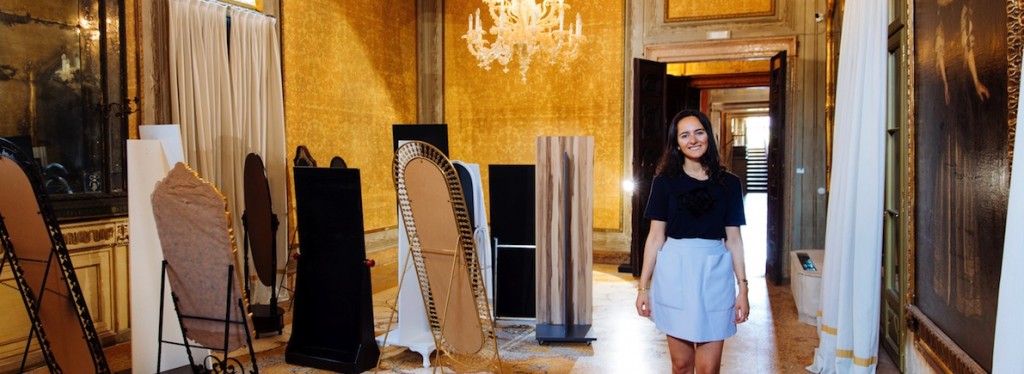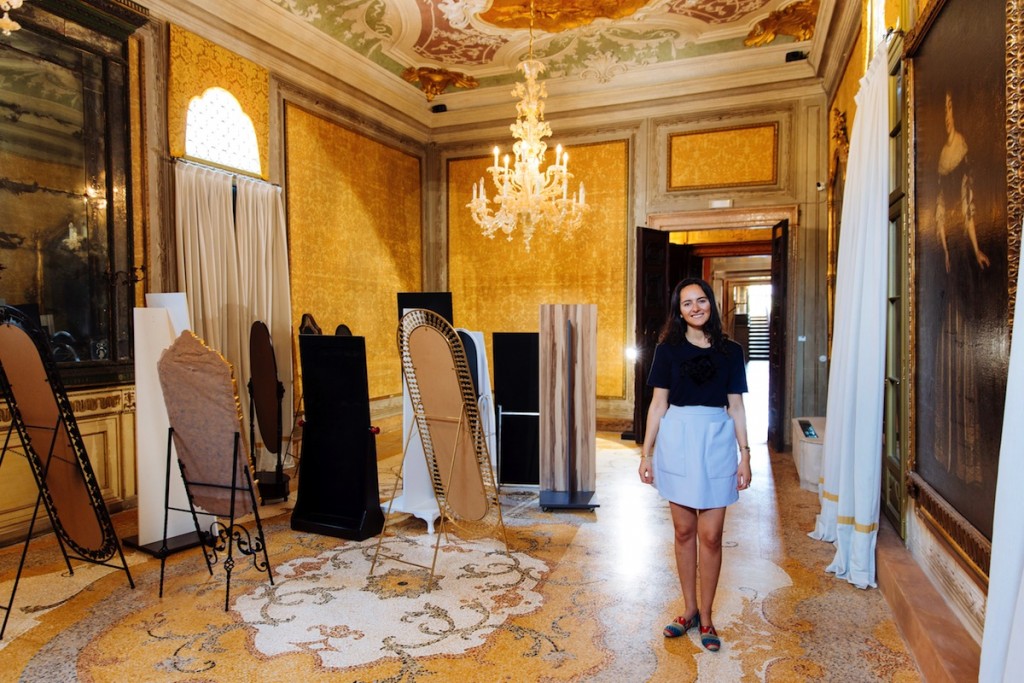A Venetian palazzo (called Barbaro-Curtis) is starring with Baku in a site specific exhibition paired with a catalogue that is more a fine book of history and stories than just a fine art publication – and, of course, all this story has the Venice Biennale as background.
This is, in few lines, our encounter with Suad, curating The Union of Fire and Water that is even better than the official national pavilion of Azerbaijan (exhibited two doors away Palazzo Barbaro hosting the exhibition she curated).
She is working for a non-profit organisation, YARAT, that was founded by artists in 2011 (the Foundation founder, Aida Mahmudova is a young nice of the Republic’s first lady). Yarat, whose new strategic director is Bjorn Geldhof (former deputy manager of Pinchuk Art Centre, foundation of the homonymous media tycoon) is now hosted in a brand new building on the Caspian Boulevard and is devoted to researching and spreading the art of Central Asia and west countries to its citizen together with the promotion of Baku’s and beyond artists abroad.
These countries seem very attached to the mainstream of politics and of their strong oil economies, but Suad’s touch is very cultured, extremely keen of the context.
You’ve time to discover it, for free, until November 22 by visiting the Yarat’s exhibit in Venice and until January 9 (2016) to visit The Heart is a Lonely Hunter if you will be in Baku – this is a group exhibit focused on graphic and video art in collaboration with Rhizome (New Museum, New York).
This conversation was having a touch and go via phone when the well-known winds of Baku were whispering around us – constantly. And ended online few hours ago.
Your story (biography) in 10 lines with a specific hint about your childhood and the studies
I started myself from here.
I initially studied in the schools of Baku, then I went to university in England where I graduated in philosophy, political science and economy from LSE. I worked a little bit in finance there (Lehman Brothers before that went bust and Nomura) and at that time art was considered as a little cosy spare time. Then things evolved and I decided to leave finance and to make of arts a separate profession.
So I took another degree in modern and contemporary art, more on curatorial studies
I was born in Baku and I am actually 30.
I have some family in London but most of them are in Baku.
I have had a very normal childhood. I was born and raised here and moved to England at 18 for the university. I stayed there for almost 11 years and moved back here to work for Yarat, around a year ago.
Curator, manager, art market expert: which is the task that represents you better now?
Now I think is that of the curator. I started to work for Sotheby’s where they were looking for a specialist with a curatorial approach exploring the market of Central Asia and also here, at the Foundation, they look for the same kind of task to explore the current scene in the country and beyond.
The first exhibition I organized for Sotheby’s (2013) went very well and they’ve asked me to continue to explore the contemporary art scene of Russia and Eastern Europe, with a keen eye on young artists and video-art that is very unusual for them.
When I did another exhibit, artists from Istanbul to Kabul, I was more and more curating rather than managing. When I was invited by Aida, the Yarat founder, to curate the second Venice Biennale event for their organisation, that is a collateral event of the festival, I was immensely happy to accept. When I was offered to start the program at Yarat, curating their program for the new Centre (before the Venice show) I was already collaborating and consulting for them about which artists to follow. It is always very important to know the art market also, because everything is interrelated.
And how did your first encounter with arts happen?
My first encounter with art has originated in my family (but not in the sense they’re collectors). Even if locally, they are very linked to creativity, I have family members who were composers and theatre directors and I was growing up in this milieu.
Once in London I was starting to visit contemporary art galleries and I was very attracted by the fashionable world of arts and this hobby became more and more important once years were passing. I started then with courses of introduction to contemporary art, then to get the Masters.
I guess it was a slow pursue of a career, all in all.
Yarat and the Baku’s population: which kind of public and how much young audience visit the new art centre? Which is the preferred interaction of your audience: exhibits, workshops, social gatherings? Is the Yarat education program free of charge?
You know, our city has just turned 2.5 millions of population, the majority is young and the population is growing – they are very used to festivals and exhibitions, a wide range of cultural events, spanning from craft to opera. Modern (and Soviet) art have been more known originally, together with art of 60ies and 70ies. And all the citizens are used to it also because the Baku Metro (the subway) is rich of art and murals.
Contemporary art is totally new here but also exciting given that the audience is young: they love it especially for the social side of this kind of cultural events. They always love to learn something new, we have lots of educational projects and screenings and I tell you, we’re proud of how these are extremely successful. Everything is free of charge, always. We have an auditorium with a capacity over 200 seats and is always full with lots of people standing. There is a lot, really a lot of interest for alternative art education: talks, workshops, screenings and conferences are the most popular among our activities.
Is Azerbaijani art milieu made more of expat rather than resident artists? Which is the relation with the artists and the political sphere?
Most of the artists prefer to live here but, you know, also some live also abroad, as for instance the painter Niyaz Najafov, Babi Badalov..Then there is also the famous photographer Rena Efendi.
The main contingent of artists anyway lives here, because is here where they take the main inspiration, the main material. Even if they learn new techniques, even if they are invited abroad, even if they get more exposure, even if they often go to residencies, most of their studios are always here in Baku because there is lot to happen (and to do) here. Regarding the political situation, it depends: some artists are very abstracted from the political subject. Of course the major event entering in the imagery of the artists has been the crash of Soviet Union, but they open up to new ideas or to new developments, the new lifestyle and what it means in relation with the old traditions (many are revisiting these traditions, many are indeed questioning them). Some of them are critical of the political situation but this depends from artist to artist, the scene is very varied and each one is looking for his own language.
Which is the most important achievement you obtained as curator and which is, on the other hand, the one as the more intimate yourself?
The Venice project in the Palazzo Barbaro during the Biennale embodies both, from a professional point of view was very important given the results and from a personal point of view because it was very much emotional and involved an entire, dense year of my life. As a team, we also entered in this story that runs along the centuries and goes back to my native city: this is very touching and allowed all of us to re-read it in a sense.
This coincided with the year in which I was working again back in Baku, rediscovering again my city in the actual form of its life, on the ground!
Moreover – after the intense work with the palazzo, the festival, in a word all the process – the relation with the artists was so fulfilling and great!
As a woman, I think it was always important to me to be able to create my life outside as a self and not so much as a woman – much more as a person I should say. I managed to build a very independent life and to have a very solid group of friends, both in Baku and in London, and by working hard to really pursue my career….Yes, of course, I would love to have children one day but for this you have to ask me again in some years…
What Baku is giving to you and vice versa?
It’s my home, my culture, my heritage, it gives me a lot, no matter where you go.
I feel it very much and I feel very much attached to it: the connection is really strong and for me this is incredibly great.
It is also very present with associations with the crafts, the music. So Baku is giving me what I am – the most important gift. Given the city is evolving a lot, there are always new exciting exchanges with it.
What I give to Baku? (silence, smile) Mhhh, my throwing in projects, by inviting artists – my scope of work at the moment – here and using materials from Baku and contacts from Baku to develop new works that will be seen everywhere in the world with Baku as a subject…yes, this can matter. But in general, the fact we (together with the founders and the other colleagues) are running a centre like Yarat that is not only dealing with arts and artists but with the city itself … this can make a difference. In that sense, we are all contributing!
Can you share your favourite cooking passion?
I am an awful cook but I love to eat. I love food. Italian food is great, but I prefer Azeri :).
Which is your favourite wine or drink?
I do not drink wine so much, I prefer sparkling water or lemonade. Or offer me a cappuccino, if you want!
Which is your music or the book(s) with you now (and on which kind of side table or desk the book(s) lies down now)?
Right now I am reading My Name is Red by Orhan Pamuk. It’s a medieval detective story set in Istanbul during the Ottoman Empire- an interesting exploration of culture and the city life at the time, as well as its relationship to its neighbours on the Persian Empire side- meaning us.
It’s on the sofa:)
Which has been the place in this world where you successfully lived “slow”, if this ever happened?
Venice! I arrived a month before the installation and fell in love with the city, its narrow streets, bridges, churches and the rhythm of water. I hope to come back soon.
Which is a talent you have and the one you miss?
Curiosity- I am curious about everything and love to learn new things and meet new people. So life is never boring.
I always wished I could sing and play instruments. I tried the piano and guitar once but unfortunately I am not very good at making music:)
What have you learnt from life until now?
To be open to new experiences in life and to always challenge yourself. And that it is ok to leave everything and start fresh, as you never know where you end up!

